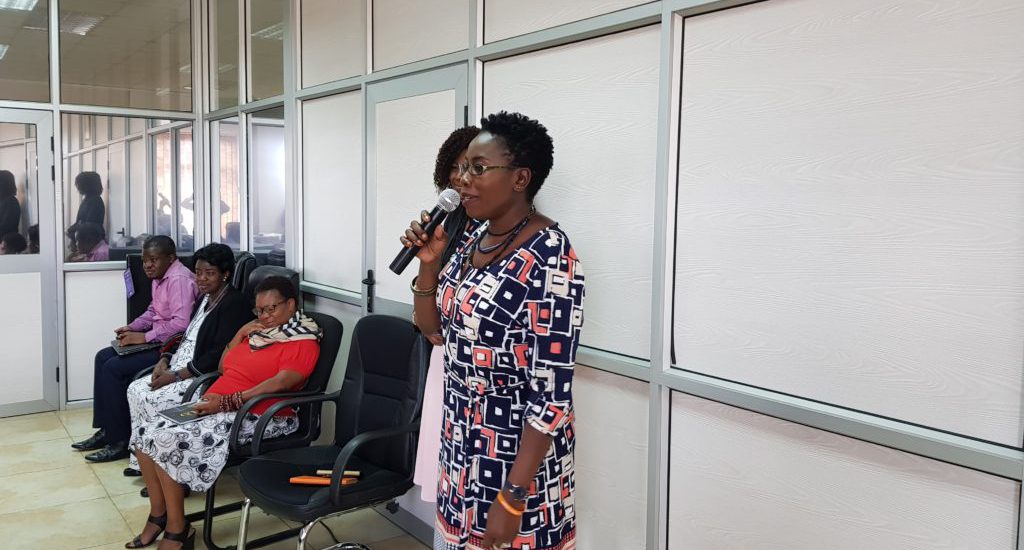A Reflection On Women’s Rights
- March 27, 2018
- Posted by: Admin
- Category: News Stories

As part of Women’s Week Celebrations the Electoral Commission of Zambia (ECZ) on 6th March, 2018 during the Meet-Up staff were engaged in a Dialogue titled: “The Status of Women in Relevant Sectors.”
This year International Women’s Day (IWD) was celebrated under the theme, “Time is now: Rural and Urban Activists Transforming Women’s Lives.” In reflecting on the significance of IWD Commissioner Dr Joy Emily Sikazwe said that it was an important occasion when women globally, past and present, were honoured. “In Zambia we walk in the foot steps of gallant women such as Julia Chikamoneka, Betty Kaunda, Mary Fulano and many others who faught for our independence,” adding that these women understood and fought for democracy by deciding to get it back from the colonialists without shedding any blood.
Commissioner Sikazwe said, “They also fought so that our girl children through affirmative action could pass through college and university” urging that women’s rights are human rights. Commissioner Sikazwe further reflected on women’s rights, access and control and how women were participating in the affairs of the nation and their work in the communities.
She observed that at the Commission people had accessed loans. “How many men have accessed loans because if we are talking about equality, I think the Loans Committee must say this year ten men have accessed loans, whether car or house loans, and only five women have accessed the loans. Those questions you must begin to be ask.” She stated that when it came to positions of Office Assistant, they could be male and female and that both had the responsibility of cleaning at the office, “Do you see the male Office Assistants doing the same thing they do here in their home?” “They will not because here they clean for money. Even when the wife or sister is sick, that job is seen as a job for a woman,” Commissioner Sikazwe elaborated to staff who were participating in the dialogue on gender and rights.
Making comments on the issue of access, control and benefit, the Commissioner asked those with access to land and title deeds how they were benefiting from that land or house that they had bought. “Many times women get loans to buy a car that will be used by the husband and his siblings. She can even walk to work but she bought a car so that the husband feels oh! I am well married my wife has access to loans. Others get loans to buy a house so that ‘my husband’ can love me and put the title deed in her husband’s names. So when we talk International Women’s Day, it is to reflect on these things. Reflect and say where am I as a woman?” Commissioner Sikazwe asked.
She called on everyone to reflect on what she had also observed when writing a will, where a mother with two daughters and two sons, will give the house and farm to the sons and the pots and her cloths to her daughters. Commissioner Sikazwe challenged all to reflect further and say “what is it that we are doing when fathers leaving a will would leave all their property to their parents and siblings saying my wife, we just met she is not related to me, but you have lived together for 30 years.” “Why is it that when you decide you don’t want your wife anymore, you say collect your children. So she leaves the house with her children and you (the man) remain with your relatives. So let’s reflect and say what it is that we are doing?” said Commissioner Dr Sikazwe.
Meanwhile, Ms Womba, a Gender Analyst from UNFPA called on all partcipants to the dialogue to be aware of issues of their rights regarding ownership, such as titles and licences in order not to be disadvantaged in the event that there was a death among partners or married couples. She asked women and men to ask themselves this question, “Documentation that you have how empowered are you?”
Ms Womba said it was important to take affirmative measures in gender issues in order to take care of the disadavantaged in our society. She revealed that although a lot of strides had been made to change the status of women to reduce the gender gap there were lots of barriers and the impact of poverty affected women significantly.
